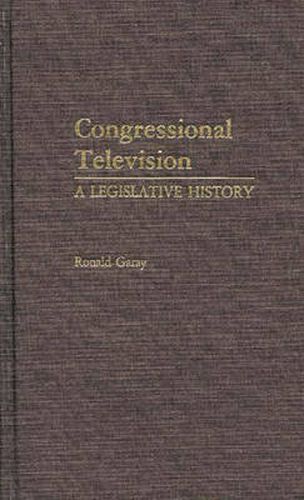Readings Newsletter
Become a Readings Member to make your shopping experience even easier.
Sign in or sign up for free!
You’re not far away from qualifying for FREE standard shipping within Australia
You’ve qualified for FREE standard shipping within Australia
The cart is loading…






Using a format closely resembling a legislative history, Ronald Garay traces the progress of congressional television from its inception in 1922, when the first resolution seeking approval to broadcast House floor proceedings was introduced, to 1979, when legislation allowing that coverage was finally passed. Garay presents the major arguments that have been voiced, both inside and outside Congress, in support of or in opposition to televising congressional proceedings. He places the controversial congressional hearings of the 1950s, the Senate Watergate hearings, House Judiciary Committee debates on presidential impeachment, and other major events in the context of the overall legislative history of congressional television. Garay probes the motivations that prompted Congress, congressmen, and senators to pursue such legislation and also provides insights into the impact television has had on member conduct, legislative proceedings in the House and Senate, and on the congressional television audience.
$9.00 standard shipping within Australia
FREE standard shipping within Australia for orders over $100.00
Express & International shipping calculated at checkout
Using a format closely resembling a legislative history, Ronald Garay traces the progress of congressional television from its inception in 1922, when the first resolution seeking approval to broadcast House floor proceedings was introduced, to 1979, when legislation allowing that coverage was finally passed. Garay presents the major arguments that have been voiced, both inside and outside Congress, in support of or in opposition to televising congressional proceedings. He places the controversial congressional hearings of the 1950s, the Senate Watergate hearings, House Judiciary Committee debates on presidential impeachment, and other major events in the context of the overall legislative history of congressional television. Garay probes the motivations that prompted Congress, congressmen, and senators to pursue such legislation and also provides insights into the impact television has had on member conduct, legislative proceedings in the House and Senate, and on the congressional television audience.